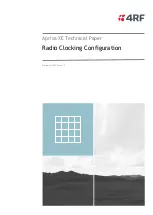
Aprisa XE Clocking Technical Paper
7 | 15
Issued by: 4RF Customer Services 15 January 2009
Figure 6 : Card select
Select the port of the card which you want to make the network
clock source. Click on “Edit” button once
selected. For HSS cards this step is not required as the HSS card only has a single port.
Figure 7 : Interface port select

































